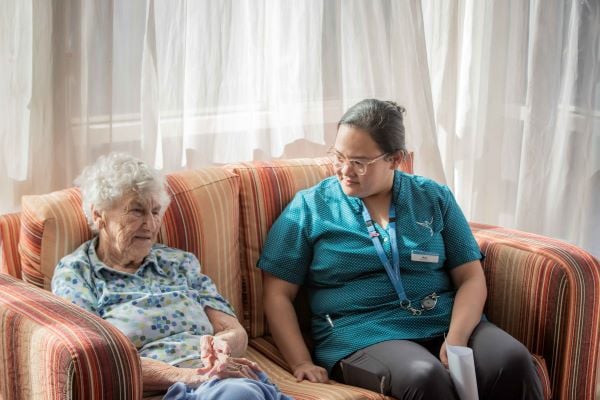...My mother is a resident and she loves her room, meals and all the staff who are both caring and respectful towards residents and visitors. I wholeheartedly recommend this facility.
Why choose Catholic Healthcare residential aged care?
As a resident at Catholic Healthcare, you will feel at the heart of a community that values your well-being and dignity. Your dedicated team are not just experts in aged care, but they are genuinely committed to enhancing your life. It's the little things that we do, to make it feel like home, like knowing your laundry is cleaned in-house by employees, and enjoying meals that have been freshly prepared in the kitchen every day.
Our chefs have even teamed up with the Maggie Beer Foundation, to enhance your dining experience and you will often be asked to taste test the new menus. In many of our homes you will also appreciate the convenience of having allied health professionals, hairdressers, and even cafes right where you live.
By joining the Consumer Advisory Body, you will feel empowered by having your say in the community you're a part of. You may even be involved in the selection of new employees, after all, they are there to make your day better.
We believe you won’t be asking why to choose a Catholic Healthcare home, but want to ask, which one will suit you best.
How do you know when you, or your loved one, is ready for residential aged care?
Deciding when you or a loved one is ready for residential aged care is a deeply personal decision. It typically comes down to a combination of factors, including the level of care needed, the ability to manage daily activities, and the overall quality of life.
Signs that it might be time to consider aged care include increasing difficulty with routine tasks such as bathing, dressing, and meal preparation, frequent falls or safety concerns, and chronic health conditions that require professional monitoring and treatment. It’s also important to consider the emotional well-being of the individual; feelings of isolation or loneliness can indicate that the social interaction provided by a residential care home could be beneficial. Try using our downloadable checklist, What are the signs to look for to assist you in decision making.
Ultimately, it’s a conversation that should involve the individual and family, healthcare providers, and sometimes a care advisor to ensure that the move to residential aged care is made at the right time for all involved.

What can you expect when you move into a Catholic Healthcare residential home?
We understand that adjusting to living in a residential aged care home can signify a major change in lifestyle and so it is important to have time to adjust to this change. This will likely impact you’re your family and loved ones. Catholic Healthcare understands this and will be here every step of the way.
On your first day...
Arrive around 10am
We ask all new residents to arrive around 10am, so we can really start to get to know you.
Our Leadership Team from the home will be available on the first day to greet you and welcome you into the home. Throughout the day you will meet the Residential Manager, Care Managers, our Chef and Lifestyle team.
Welcome lunch at 12pm
We will welcome you and your family into the dining area to share lunch together and experience our dining experience for the first time. We will spend the afternoon discussing the range of services your home offers, getting to know you and understanding the things that you will enjoy. You are encouraged, with the support of your family/carer, to make your new environment more comfortable by bringing along some personal belongings from home e.g. photos and mementos. Small pieces of furniture are also welcome, it’s all about making this your new home.
After settling in...
Get to know the home's Pastoral Carers
As you and your family embrace this new chapter at our residential aged care home, we recognize the significance of this transition and the emotions it may evoke. Our commitment to supporting you every step of the way remains steadfast and during this time we encourage you to get to know the home's Pastoral Carer who is available to support you.
We eagerly anticipate getting to know you, ensuring your comfort, and enriching your experience with our diverse activities and personalised care. Together, we can make this your new home, filled with warmth, companionship, and a sense of belonging.
Wellbeing and leisure
Our lifestyle program is designed to enhance your emotional wellbeing in a safe, inclusive environment, ensuring you maintain connection with the community.
These experiences are designed to increase levels of enjoyment, reduce stress and support you to lead a life with purpose and one that is both positive and social. Our dedicated and experienced Lifestyle Coordinators understand the benefits of social activities and are always searching for new ways to stimulate the mind, strengthen the body and nourish the spirit, working with you to understand your interests, aiming to keep the activities diverse and interesting.
As the lifestyle programs are interest-based they will vary from home to home. Many offer book clubs and meditation classes, while others may offer bowls and gardening clubs.
Participating in exercise programs, high teas, happy hour and live entertainment are popular ways to enjoy the day. You are welcome to join a group or may be assisted to pursue you own individual interests.

Some additional leisure opportunities we offer:
- Adult education sessions
- Art & craft classes
- Card groups
- Dancing
- Events and
- Entertainment
- Indoor bowls, skittles, ten pin bowling, physical games
- Intergenerational activities
- Movement to music
- Physio exercises
- Relaxation & meditation
- Seated yoga
- Tai chi
- Trivia or quiz groups
- Walking and discovery walks
- Zumba
Along with daily activities inside the home, the lifestyle coordinator is able to arrange excursions for the residents. Take a look at what some of our homes have been doing, as part of our “My Wish” program.
If you want to nominate a MY WISH for a resident or if you are a resident and would like to nominate yourself, please use this form.
Simple steps to get started
Step 1: Register with My Aged Care
Firstly, give us a call on 1800 225 474 if you haven’t already registered with myagedcare.gov.au, we will assist you. We’ll also walk you through your options and provide helpful forms and documents. Once registered, My Aged Care will then visit you to assess your eligibility and needs. Read our tips to prepare for this assessment.
Step 2: Come in for a visit
Our friendly team will arrange a tour of our Homes so you can experience what we can offer.
Step 3: Choose your new home
If you want to move forward and have chatted with your legal and financial advisors, please send in your application documents.
Step 4: Settle into your new home
We can’t wait to welcome you and will arrange a suitable moving in date. We look forward to helping you settle in and caring for you in your new home.
Watch our helpful video for more information about the steps you should take when deciding to move into a residential home.
Find a residential aged care home near you
With over 41 locations across New South Wales and South East Queensland, Catholic Healthcare offers a wide range of residential aged care options close to you.
Explore our locations to find a home that meets your needs, providing compassionate care and support in your community.
Frequently asked questions
-
1. What is residential aged care?
Sometimes, even with help, it’s no longer possible to remain living at home. If you and your family are looking for peace of mind, residential aged care could be the ideal solution with round the clock nursing and support within a managed care home.
Alternatively, you may wish to use residential aged care for respite care, a short term form of care (usually when existing family carers need a break or to experience what a particular care home is like on a trial basis before deciding to permanently move in).
-
2. Who is eligible for residential aged care?
Most Senior Australians who choose to move into a residential aged care Home will do so using a government subsidy to assist with the cost of aged care. In order to access a subsidy, assessment of your care needs must first be done by the Aged Care Assessment Team (ACAT).
You may be eligible for an ACAT assessment if you have:
- Registered with My Aged Care (visit myagedcare.gov.au)
- noticed a change in what you can do or remember
- been diagnosed with a medical condition or reduced mobility
- experienced a change in family care arrangements, or
- experienced a recent fall or hospital admission.
-
3. How much does residential aged care cost?
The cost of aged care is different for every individual and is determined by the Australian Government based on your financial situation -please see their handy fee estimator calculator at https://www.myagedcare.gov.au/how-much-will-i-pay.
You'll find there are three different types of fees and charges that may apply when moving into any aged care home as follows:- Basic Daily Care Fee - This is the standard charge for every resident in aged care set by the Australian Government and is calculated at 85% of your single Centrelink pension. This fee covers costs for meals, laundry and utilities.
- Accommodation Payment - All residents who the Commonwealth Government determines to be non-supported will pay an Accommodation Payment. There are four options for paying the Accommodation Payment; Refundable Accommodation Deposit, Daily Accommodation Payment, a Combination Payment and a Drawdown Payment.
- Means Tested Fee - This is a contribution towards the cost of your care. This fee is determined by Centrelink or DVA and may not be applicable to you.
How much you pay depends on your financial situation, which is assessed by Centrelink and is based on your income and assets.
-
4. What is the difference between a RAD and a DAP?
- Refundable Accommodation Deposit (RAD) - A lump-sum payment option if you are required to pay for your accommodation in full. This is refunded when the resident leaves the aged care home.
- Daily Accommodation Payment (DAP) - A recurring rental type payment option to be paid in increments if you are required to pay for your accommodation in full.
- Combination Payment - A payment option consisting of a part RAD payment supplemented with a Daily Accommodation Payment.
-
5. What is included in the cost?
There are a wide range of services covered by the above-mentioned charges, including (but not limited to) care, accommodation, room furnishing, electricity, water, cleaning, general laundry, meals and refreshments.
Don't just take our word for it!
Latest news in residential aged care
Acknowledgement of Country
We acknowledge the Traditional Owners and Custodians of the lands on which we live, work, and dream. We pay our respects to the Wallumedegal People. To their Indigenous Elders past and present, for they hold the traditions, culture, and hopes of their people as we journey towards reconciliation. We acknowledge that they have occupied and cared for these lands and waterways over countless generations. It always was, and always will be, Aboriginal land.







